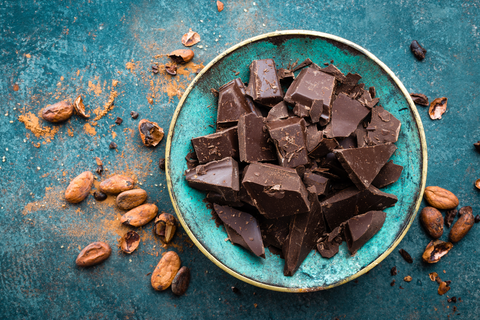A recent article in The New York Times tries to answer the million-dollar question. As expected, there is good news and bad news.
Chocolate is increasingly loved by the human race
Between 2016 and 2021 global chocolate market grew by nearly 20%, says The New York Times. Can you resist a bite of chocolate? We can't, sorry, not sorry! We LOVE chocolate. Think about it, the dark gold is always part of our emotional moment: when we are sad or happy, when we celebrate special days like weddings, Valentine's Day, baby showers, or Christmas.
Dark, white, or milk?
White or milk chocolate aren't healthy options. White chocolate, for example, despite the name, doesn't contain chocolate at all; milk chocolate is delicious but is dangerously loaded with sugar and fat. Dark chocolate contains more cocoa, but it is crucial to check the label. The recommended percentage is at least 70%.
Researchers suggest that the "food of the gods" might benefit health
Finally, science seems to give us a reason to eat chocolate guilt-free! Of course, we talk about dark chocolate.
"Cocoa is clearly good for you," said to The New York Times Dr. Dariush Mozaffarian, a cardiologist and professor of nutrition at the Tufts Friedman School of Nutrition Science and Policy. "Whether chocolate is good for you or not depends on how much cocoa is actually in it, and what else is in it."
Good news
The newspaper reports: "Many small, short-term human trials, have found that dark chocolate or standardized cocoa supplements or drinks can modestly lower blood pressure and improve blood cholesterol and the health of blood vessels in adults. And some longer term observational studies have found that those who eat more cocoa might have a lower risk of certain cardiovascular diseases, Dr. Mozaffarian said". The New York Times adds the results of a recent study: "In a systematic review published in February in the journal JAMA Network Open, Dr. Mozaffarian and his colleagues examined how certain foods and nutrients were associated with heart health conditions. They found "probable or convincing evidence" that eating chocolate was linked with a reduced risk of cardiovascular disease, estimating that an average daily intake of just 10 grams, or about one-third of an ounce of chocolate, was associated with a 6 percent reduction in the overall risk of cardiovascular disease."
Bad news
However, The New York Times notes: "Observational study findings have also been inconsistent. Some have found no benefit, and others have found that those who eat chocolate habitually or more frequently are more likely to gain weight, she pointed out. Such studies also don't often account for the different types of chocolate, which can vary in their cocoa content. And the sugar, fat and calorie count might negate any health benefits from the cocoa." In conclusion, moderation is the key. According to experts, chocolate is a treat, it is important not to perceive it as a health food!



